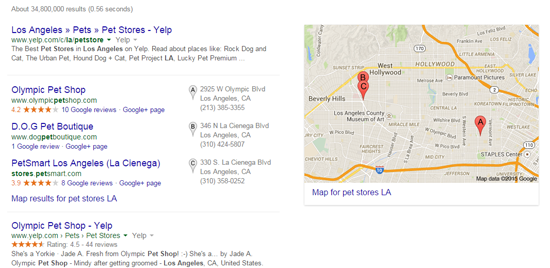Why Ranking First Isn't All It's Cracked Up to Be

It's perfectly natural as a business owner to want your business first in Google.
After all, it's the most visited website in the U.S. and the top destination for finding a product or service. As a result, search engines are the largest source of traffic to websites in most industries.
Since Google owns more than 75 percent of the search market share, ranking first in its results pages can snag a significant percentage of surfers.
Many businesses consider this the ultimate goal of SEO. Surprisingly there are downsides to ranking first in Google, with the most common ones listed below:
1. Ranking first doesn't reach all customers
Believe it or not, some users will click on the paid advertisements above the first organic results.
Even more unbelievable, studies have confirmed that being visible with an ad and showing up first can as much as double the amount of traffic your first position typically captures.
This is one of the many reasons why pairing Google AdWords with an organic strategy is better than focusing on one or the other.
Second, searchers don't always want to go to a business website, some users want to evaluate first.
There are 10 positions on the first page of Google; only several of those positions will be competitors. For certain queries, users will prefer directories over a business website.
Many will ignore the first few organic results, preferring businesses with many reviews in the local map pack or Yelp (like the Olympic Pet Shop below, with both Google and Yelp reviews), Yellowpages and the BBB to receive an unbiased recommendation.

Why rank only first when it's better to rank first organically, first in a paid advertising slot, second in the local map pack, fourth via the BBB (where you come up third), seventh via your Yelp page and ninth from your YouTube video?
Ranking first only captures 30 - 40 percent of traffic. Dominating the search real estate in other areas is possible and can snag much more.
2. Ranking first isn't always possible or necessary
Is it possible to outrank the BBB or the Yellowpages for "AC Repair"? Those sites will have much more authority and a much bigger marketing budget than your business. If you can't beat them, join them!
Again, not every position in search results will be a competitor. In fact a majority will be opportunities for your business to be visible.
Focus on Barnacle SEO, which means increasing your visibility on non-competitive sites that are already ranking for your key terms.
Lawyers, for example, should focus on superlawyers, findlaw and AVVO. For an HVAC company it can be homeadvisor, the ACCA.org and certification sites like energystar.gov.
Some of these directories will be paid while others will require a certification or a nomination to win an award. Once listed, ranking first on these sites could require reviews, a detailed and accurate profile, and more.
Besides competing with directories and other sites in search results, it may be cost-prohibitive to achieve a first position ranking.
Let's say you want to rank first for earthquake insurance in Kansas City, Kansas. Problem is, there hasn't been an earthquake in Kansas for as long as anyone can remember. Except, there just was an earthquake yesterday (let's say)!
The time it would take to write content for this new page and get it ranking would outweigh the cost of paying for a quick and instant advertisement online. When timeliness or the volume of traffic searching for your specific service or product is low, it is cheaper and faster to pay for advertising.
3. Ranking first makes you more visible to the 'wrong people'
It's true, ranking first gets you more visible to paying customers, but it also makes you visible to competitors and spammers.
Your site will now be on a pedestal and competitors will skew your traffic statistics and possibly even negatively target your site. It's known as negative SEO and it can happen in many ways.
Your site could be added to a link network, where thousands of bad links from China and Russia point to your site. Your competitors may attempt to increase their position in search results by paying others to click on their sites over yours. Or your site could even be hacked.
There are truly many things that can go wrong with being so visible, and not all of that visibility is a good thing. It's always a good idea to monitor your site or have your consultant/agency monitor and prevent these problems from occurring.
4. Ranking first doesn't always convert
If you rank first in Google, you will be visible to paying customers and a percentage will click on your listing, visiting your website.
Yet, how many will then fill out a contact form, subscribe to an email newsletter, buy your product or service or call you to discuss their requirements?
There are truly many drop-off points that can occur along the path to conversion. Some questions to ask:
- Can your sales team close once a customer is on the phone?
- Are email inquiries responded to quickly and professionally, or do they get lost in spam?
- What is the bounce rate of your landing pages that rank well in Google?
- Are you actively optimizing these pages to solve customer problems and improve the number that close as customers?
- Are you measuring the profitability of customers that search for your business online vs. those that are referred to your business, vs. those that clicked on a paid advertisement?
5. Ranking first doesn't mean the job is complete
One of the biggest misconceptions is that once a website ranks first, the marketing budget can be cut, SEO can be stopped and the business can reap the continual reward of being visible to paying customers without incurring any cost.
This misconception can be attributed to the days of Yellow Pages advertising where a once-a-year fee paid for advertising over the next 12 months. Not much changes in print advertising, but the Internet is a very different beast.
For the same reason customers can find, call, review and buy from your business online 24/7/365, SEO work is never truly over. Marketing is always a work in progress and to truly dominate your market and industry, your site requires constant attention, optimization and strategic work.
So many businesses falsely believe that ranking well in Google is the only path to conversion, but it often involves far more marketing channels and touches that ultimately convince a website visitor to become a loyal customer.
Even Google admits search isn't the only answer, but only one piece to a much bigger puzzle. Google created an interactive customer journey to online purchase that even breaks down conversion by industry.
For every industry, a combination of display advertising, paid search advertising, organic visibility, email marketing and more work together to convert customers online.









